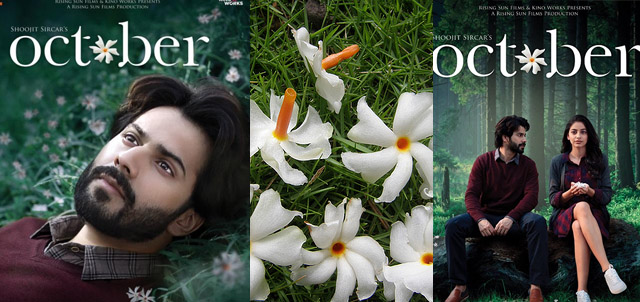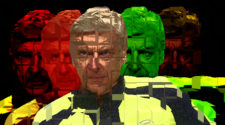October is essentially ‘a film’. It is not a story, it cannot be a novel, it can only be a film. Visuals are the soul of the film, no powerful dialog, none of the excessively dramatic performances we are accustomed to in a hindi film, here the film conveys everything in a subtle sublime manner. The movie is essentially a tragedy, a promising 21 year old has a near fatal accident which robs her of everything. The beauty of the film is in spite of such a sad premise, the movie does not rely on overt crying sequences to convey the tragedy. Instead, it uses the natural language of human beings, it uses body language, it uses the language of the eyes, it uses the language of the unsaid, finger movements, slight dropping of shoulders, stares and glances are the grammar of the film.
To say that October has a story will be a stretch. Instead, October is a moment, it is the journey of a moment, exploring the human state, staying with the human condition.
The lead characters of the movie are Dan and Shuili. They are not a couple, no romance, no love interest, nothing. On the face of it, they are just acquaintances, work colleagues. Yet we feel a connection between them. The poetic strand in the film is in the way their relationship is established, we are made to ‘feel’ the connection by the language of the eyes, by subtle silences. In a scene, an upset Shuili is gathering flowers from the floor back into a bowl, which presumably was dropped by Dan. Dan initially feigns ambivalence to the whole thing, but the manner in which he collects the last two flowers and keeps them into the bowl, he shows concern veering close to an apology, all this without saying a word.
Just as we feel that something might happen between the two, Shuili meets with an accident that renders her comatose. Here any semblance of movement or pace gives way in the film, and the film pauses. Time does move from one season to another, yet like in a meditative state, where the passage of time is a mere formality, the time space of the film is unmoving.
Shuili is now essentially nothing more than a statue, she is blank, her wide eyes do not dilate a millimetre. Almost spiritually, the movie invokes human empathy and shows how we as humans project emotions. The characters project their emotions onto Shuili. Shuili becomes resolute, she is a fighter, she is a loving person. All these are just projections of those grieving around her. Beyond a few scenes and a couple of lines from her, we do not know who the real Shuili is, yet, the beauty of the film is that we as an audience also become part of that projection, we believe that projection in that moment.
For Dan the film is a journey, he is grieving, but he does not understand his grief. Those around him also do not understand his grief. They have no rational reason for his grief, he is not related to Shuili. Dan’s mother wants to rationalise this as a romance to understand Dan’s state. However, defining the state displayed by Dan as ‘love’ might bring a certain rationality to his actions, but it will be cynical. It is similar to altruism between two distinct species, for example a cat adopting and raising a baby squirrel as its own, irrational at its core, maybe a fault in the genetic makeup, contrary to Darwinian ethos, yet no one can deny that it is ‘special’. Dan’s care for Shuili is similarly ‘special’
The movie is thus very human, Dan comic relief amidst misfortune is also human, very real! Grief and misery are a human, but no human emotion in monotonous, we as people cope with despair in our own way, some are resolute, some waiver, some try to be realistic, practical, some rely on unreal hope, some just go with the flow, and the film shows us all those shades. The film relies on invoking a concept of humanness beyond reason.
The biggest surprise the film pulls off is the end. It is predictable, the tone of the movie is preparing us for the end, and yet we are somewhat shocked, the grief is real. Then again we do not feel utter despair at the end, we are left with hope.
Another feature of the movie is that it is laden with metaphors beginning from its title. Where is Dan? becomes the metaphor for Dan lost in his own emotions, struggling with finding identity and purpose. Shuili, the seasonal flower, again is an apt metaphor at use for the momentary effervesce of its lead character.
The relationships are kept silent, why do we feel something about someone, why are relationships formed, what is the hook in a relationship. This movie goes beyond the transactional nature of relationships, relationships are just a connection, mysterious, essential, source of strength and weakness, no reasoning, no rationality to form, they just form.
Evaluating performances: Dan’s portrayal is honest and sincere. Dan is coping with something he does not understand, and those around him cannot explain it to him. He is thus incredibly vulnerable, and Varun Dhawan portrays it as a natural, and beyond the initial few minutes, Varun ceases to exist and we are left with only Dan. Shuili has no lines, no movements, she has only expressions, hence her performance is to be felt, and we cannot applaud enough by words. The rest of the characters are also true. However, the movie is much more than the performances, it is much more than the music, it is much more than the direction. It is truly a movie where is whole is greater than the sum of its parts. Truly watchable experience.

Watch it in a quiet theater! (hopefully without an interval break!)
look and feel
–
99%
acting, characters, performances
–
99%
music, score
–
95%
idea, emotions,
–
95%
Just like that
–
99%














No Comment